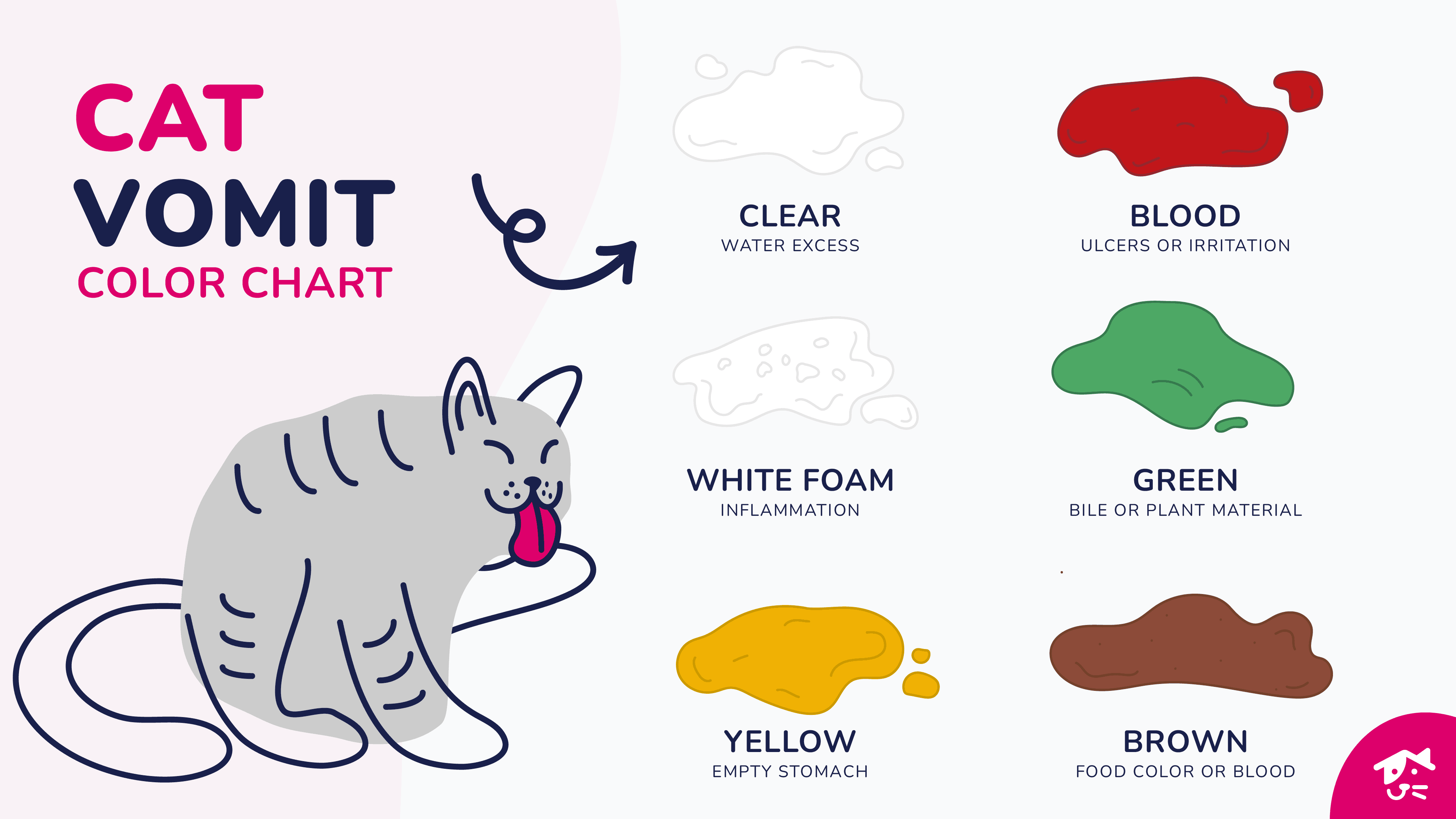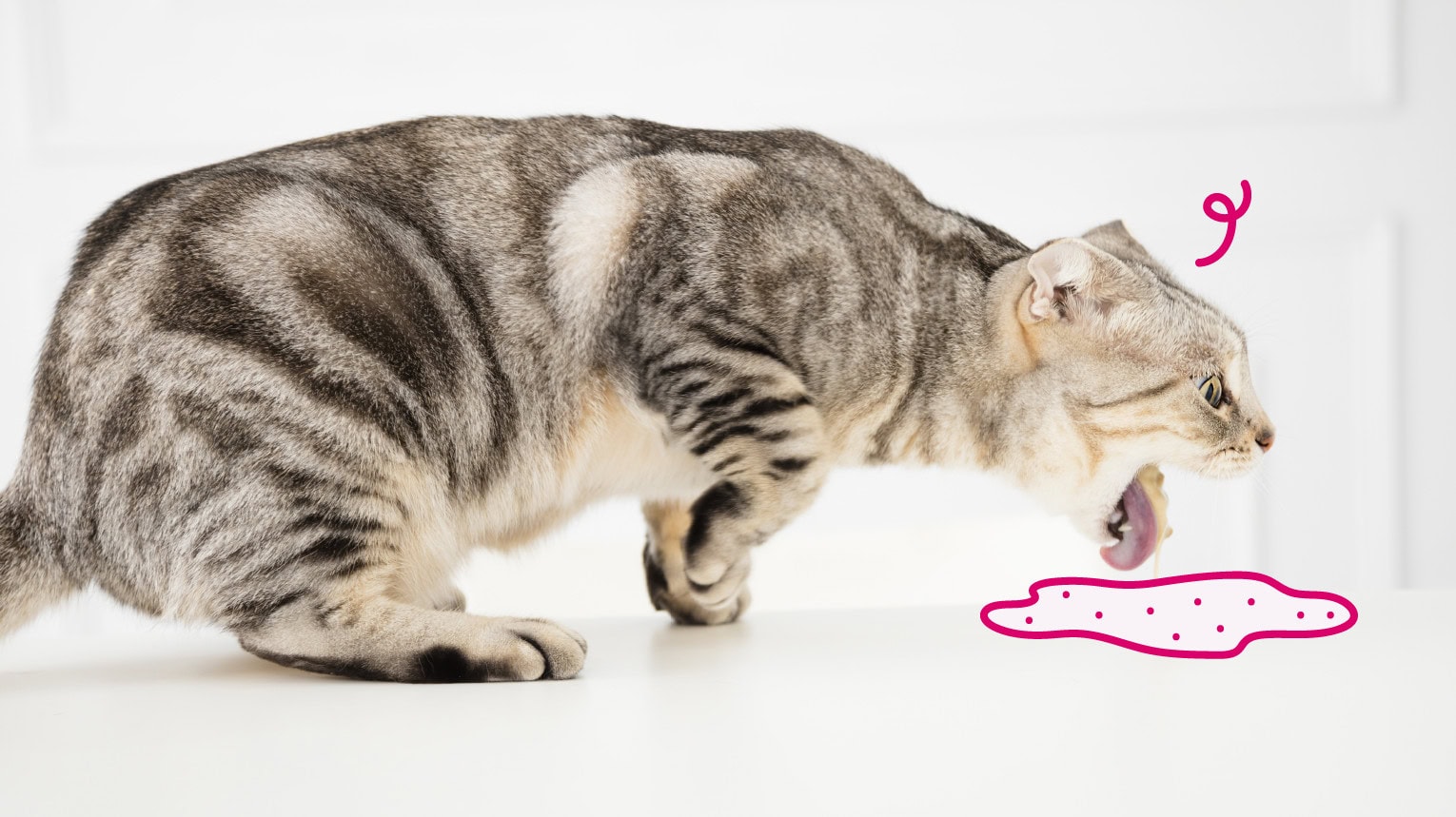Cats vomit for various reasons, from benign to serious, and it can be alarming to see your furry friend display this behavior. While occasional vomiting might not be a cause for concern, especially if it’s a hairball, frequent vomiting or vomiting accompanied by other symptoms can signal a more serious issue.
This article explores the common causes of cat vomiting, the different types of cat vomit you might encounter, and when to seek veterinary attention.
Key Takeaways
-
Cat vomiting is not a specific disease or diagnosis by itself but rather a symptom
-
Occasional vomiting (less than one to two times per month) may be considered normal for most cats, especially if the vomiting contains mostly hair (hairballs)
-
When vomiting occurs frequently or combined with other symptoms such as weight loss, decreased appetite, or lethargy, then this can be a sign something more serious is going on
Common Causes of Cat Vomiting
It’s important to remember that vomiting itself isn’t a specific disease but rather a symptom of something else going on in your cat’s body. The cause could range from simple dietary indiscretion to a more complex underlying illness.
Common causes for why a cat is throwing up include:
1. Hairballs
Frequent grooming, particularly in longhaired breeds, leads to hair ingestion. Cats then vomit to expel these hairballs. This is usually harmless unless it happens excessively.
2. Dietary indiscretion
Cats are curious creatures and might eat things outside their normal diet, like garbage, table scraps, or plants.
3. Overeating or eating too quickly
Overloading the stomach can also trigger vomiting. Depending on what your cat ingested, it may vomit clear liquid or white foam.
4. Food allergies
Just like humans, cats can develop allergies to certain foods or ingredients, which can lead to vomiting.
5. Infections
Bacterial or viral infections involving the digestive system can also cause cats to throw up.
6. Parasites
Intestinal parasites like roundworms can irritate the gastrointestinal tract and lead to vomiting.
7. Toxins
Exposure to toxins or harmful substances like lilies (plants), chemicals, or medications can cause vomiting.
8. Systemic illness
Vomiting is often a symptom of other underlying illnesses like kidney disease, liver disease, hyperthyroidism, or diabetes.
9. Gastrointestinal blockage
If a cat swallows an indigestible object like a toy or string, it can block the digestive tract and cause vomiting.
10. Constipation
The inability to defecate can lead to a backup in the intestines and subsequent vomiting.
11. Neoplasia (cancer)
Cancer can directly affect the digestive system or cause systemic illness, both of which can lead to vomiting.
12. Inflammatory bowel disease (IBD)
This chronic condition causes inflammation in the intestines, hindering digestion and leading to vomiting.
13. Stress and anxiety
Changes in routine, environment, or new pets can cause anxiety and stress, which can manifest as vomiting in some cats.
When to Worry About Cat Vomit
Not all vomiting in cats is cause for immediate alarm. However, there are some signs that can indicate a more serious medical issue.
If you notice any of the following symptoms in addition to your cat’s vomiting, it’s best to use caution and consult your veterinarian:
-
Recurring or Persistent Vomiting: Frequent vomiting within a short period or over several days is a red flag that suggests a more serious issue.
-
Blood in Vomit: Blood can indicate inflammation or irritation in the digestive tract and always warrants veterinary attention.
-
Suspected Toxin Ingestion: If you suspect your cat ingested something poisonous, like lilies, seek immediate veterinary care.
-
Swallowed Foreign Object: If you think your cat swallowed a foreign object, such as string or a toy, seek medical attention immediately.
-
Pain or Discomfort: A painful abdomen, restlessness, inability to get comfortable, or a hunched back can indicate a serious condition.
-
Other Symptoms: Look for signs like weight loss, loss of appetite, lethargy, diarrhea, dehydration, or behavioral changes alongside vomiting, which should be checked by a veterinarian.
Cat Vomit Color Chart
The color of cat vomit can sometimes offer clues about the underlying cause. While this isn’t a foolproof method for diagnosis, it can be helpful to provide your veterinarian with this information.

Diagnostic Tests for Cat Vomiting
Determining the cause of your cat’s vomiting often involves a visit to the veterinarian. Through a combination of examination and diagnostic tests, your vet can get to the root cause of the issue and recommend the most appropriate treatment plan.
Testing for the cause of your cat’s vomiting includes:
A Veterinary Exam
A thorough veterinary exam, often in combination with diagnostics, can help identify the cause of vomiting.
X-rays
X-rays or radiographs allow for a two-dimensional visualization of the abdominal contents. Helpful in diagnosing foreign bodies or intestinal obstruction, tumors or masses, and organ enlargement
Blood Work
Blood work provides valuable information about organ function, potential infections, or metabolic imbalances that can contribute to vomiting
Barium Study
A radiopaque contrast agent is given by mouth & a series of x-rays are taken shortly after to evaluate the flow of the contrast agent through the esophagus, stomach, and intestines. Helpful diagnosing motility disorders or obstructions.
Ultrasound
Abdominal ultrasound allows for visualization of the architecture of the gastrointestinal system. Offers detailed imaging for a more precise evaluation of soft tissues and organs.
Endoscopy
An endoscope (small flexible tube with a camera) is passed into the gastrointestinal system to evaluate the mucosal lining of the gastrointestinal tract.
Biopsies and Samples
Biopsies and other samples may be collected to evaluate the tissues within the gastrointestinal tract further.
Surgery
Surgery is sometimes warranted if a gastrointestinal obstruction is suspected.
Treatments for Cat Vomiting
The best treatment plan for your cat will depend on the underlying cause. Here are some strategies that your veterinarian may recommend:
-
Hairballs: Occasional hairballs might not require treatment. However, over-the-counter hairball remedies can be helpful
-
Medications:
-
Antiemetics such as Cerenia can control nausea and vomiting
-
Gastroprotectants such as antacids can reduce stomach acid
-
Prokinetics or medications used to promote gastrointestinal motility can help with disorders causing motility problems
-
Antiparasitics or deworming may be used to treat parasites
-
Appetite stimulants may be used if anorexia or decreased appetite is present
-
-
Hypoallergenic diets or specialized diets: formulated to promote gastrointestinal health
-
Supplements such as pre and probiotics can help aid in normal digestion
-
Reducing stress and anxiety
-
Supportive care for systemic illnesses: treating the underlying cause, such as hyperthyroidism, kidney disease, or diabetes, can help reduce vomiting
-
Combating dehydration with fluid therapy
-
Surgery: to remove foreign objects or tumors
Conclusion
A wide range of factors can cause cat vomiting, some are easily addressed, like hairballs, while others require veterinary attention. Veterinarians utilize diagnostic tools to unravel the cause, allowing for targeted treatment to address the underlying issue and minimize vomiting symptoms.
If your cat’s vomiting goes beyond the occasional hairball, don’t hesitate to seek veterinary care. Early diagnosis and treatment can make a big difference in your feline friend’s health and well-being.
Frequently Asked Questions
When should I be concerned about my cat throwing up?
Signs that you should seek veterinary attention for your cat’s vomiting include:
- Frequent or persistent vomiting
- Other symptoms such as weight loss, decreased appetite, or lethargy
- Blood in the vomit
- Signs of pain or discomfort
What does concerning cat vomit look like?
Cat vomit that contains blood or is streaked with blood could be a sign that your cat has ingested a foreign object. White foam can also indicate inflammation. Consult with your veterinarian as soon as possible.
What can you give a cat for vomiting?
An over-the-counter hairball remedy may be sufficient for hairballs, but other causes of vomiting should be evaluated and treated under the guidance of a veterinarian.
What causes vomiting in cats?
Hairballs, dietary indiscretion, gastrointestinal obstruction, systemic illness (kidney disease, hyperthyroidism, diabetes), inflammatory bowel disease, and parasites are all causes that can lead to vomiting in cats.
Why does my cat keep throwing up after eating?
Vomiting after eating can be a sign of overeating, eating too fast, or sometimes can indicate a more serious problem such as dietary allergy, IBD, or systemic illness. Consult with your veterinarian to further explore the cause of this reaction.
Sources
- Hauck, S. R., Gisselman, K., Cordner, A., & Nicholson, A. G. (2016). Chronic vomiting in cats: etiology and diagnostic testing. Journal of the American Animal Hospital Association, 52(5), 269-276.
- Zoran, D. (2015). Managing vomiting in cats: what’s new for an old problem?.





